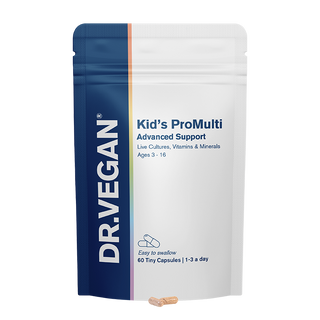How to improve children’s focus & concentration

When your child struggles with inattention, consequences may become challenging for both home and school life. Evidence suggests that children are becoming less able to concentrate, growing up as they are, immersed in a technological world filled with screens and rapid-fire information. Fortunately, like many other issues involving the brain, your child’s attention span and focus can be worked with and improved upon. By regulating the environment of your child (e.g. the amount of screen time he/she is allowed per day), creating a calm daily routine around sleep time, and including enough daily exercise as well as working on improving the diet, a huge difference to your child's attention and focus can be achieved. Let's delve deeper into the way nutrition and a balanced diet can aid this process.
Which vitamins are good for children’s brain development?
The B vitamins are brain heroes! The brain uses a huge amount of them, and as they're water-soluble and pass rapidly out of the body, even a short-term deficiency in any one of them can induce a rapid shift in your child’s mood and feelings.
A healthy diet rich in wholegrains and vegetables (especially the dark leafy ones) provides the best sources of vitamins B1, B3, B5 and B6, while bananas are also rich in B6. Folic acid can be found in spinach. B1 has an important role in turning glucose - the brain’s main fuel - into energy, and a deficiency can cause mental and physical tiredness. B3 is crucial to balance blood glucose and in producing serotonin - the happy neurotransmitter - as well as melatonin, the sleep hormone, which is very important to keep your child emotionally balanced and sleeping restfully. B5 is the memory booster and will help your child keep a sharp memory. B6, B12 and folic acid play an important role in producing neurotransmitters; B12 is especially key for a healthy nervous system.
On the mineral front, zinc is the most commonly deficient mineral and one of the most critical for mental health but also for growth. A deficiency is associated with hyperactivity, anxiety, depression and anorexia. Children can also benefit from extra zinc during growth spurts, puberty, stress or infections. Boys need more zinc from the age of 12 as zinc becomes concentrated in and leads to healthy sperm. Hemp and pumpkin seeds, as well as Brazil nuts and wheat germs, are rich in zinc.
Magnesium and calcium are also crucial for the brain’s health - a deficiency in any of these can make children nervous, aggressive and irritable. Magnesium is well known to help with sleep and muscle cramps and can be found in leafy greens, lentils and chocolate (the darker the better). Finally, vitamin C helps to balance neurotransmitters, so plenty of fresh fruits and vegetables, especially the citrus family, help keep vitamin C levels high.
Why are healthy fats important for children’s brains?
The brain is 60% fat of which 35% are omega 3 fatty acids, which in childhood accumulate in the brain and are essential for proper brain development. This fatty tissue is constantly growing and maintaining itself, so providing daily consumption of good-quality omega 3s and 6s is essential. Healthy fats such as avocados, nut butters, walnuts, coconut or hemp oil help feed brain cells and keep the clever wheels turning. It’s important to know that Omega 3 fatty acids are linked to better brain power and are not made by the body and therefore must be supplied by the diet.
The better a child’s blood levels of omega 3, the better their level of serotonin - the happy neurotransmitter - are likely to be.
Can healthy fats help with ADHD?
Around 5% of children are diagnosed with ADHD and more often than not these children have many nutritional imbalances and by rectifying these, it can frequently improve the child’s focus, concentration and behaviour.
Studies have shown that Omega 3s are key regulators of brain neurotransmission, neurogenesis, and neuroinflammation, all having an important role in the prevention and treatment of psychological and behavioural dysfunction disorders.
Furthermore, omega 6 fatty acid is also abundantly present in the brain. A recent study found that combinations of omega 3 and 6 fatty acids helped to improve symptoms of inattention in children with ADHD.
These findings are very promising and combined with a nutrient-dense diet, supplements when necessary and other non-diet-based strategies to manage symptoms, children are able to ameliorate some of the more debilitating effects of ADHD.
View our range of award-winning probiotics, vitamins and supplements.
You may also enjoy reading:


















